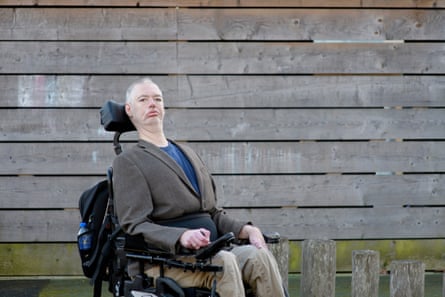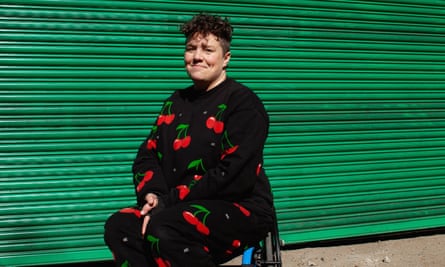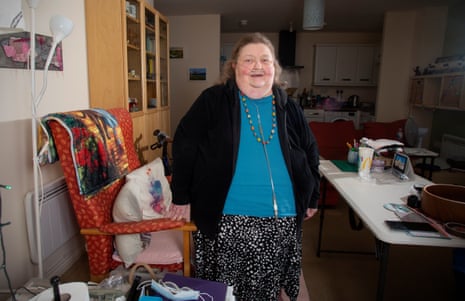Shielders are feeling abandoned. In the nearly two years since they were first told to cut themselves off from the world, people whose health conditions made them particularly vulnerable to Covid have seen official support fragment and then lapse, mask wearing become politicised, and lockdowns that have come and gone. But they have remained indoors and afraid, acutely aware of how the same society that renders them vulnerable – with the familiar indignity of rushed visits from carers or, now, demands to return to the office – doesn’t seem to care whether they survive.
For many, the headlong rush back to “normal” means the end of the few freedoms they had been able to enjoy. A trip to a shop enabled by everyone wearing masks and prescribed social distancing becomes too much of a risk when those measures disappear. Shielders are forced to make unenviable decisions about risk, balancing their physical safety with the need for connection. Many have found solace in the online disability community, but fear that this will represent their only socialising for months, if not years, to come.
Shielders do not want a return to lockdown, even if in some ways it was when they felt most supported. As three of them tell us below, they simply want mask wearing and some social distancing to remain, so they can venture out without being scared.
Heather Cawte, 60, York
I never thought that being unable to get out much would mean I was ready for a global crisis. But when lockdown struck, I was ready. Since I collapsed at the top of the stairs one day in 1999, ME – and later a reliance on additional oxygen for my severe asthma – had limited my ability to get out and about to a few trips a month. When Covid appeared, that changed to a few trips a year.
I already knew how to keep myself occupied and cheerful during long periods of isolation. When people were panicking at the start of lockdown, I wanted to say: “Welcome to my life – this is how it’s been for me for years!” If anything, I have been able to socialise more. I now have regular scheduled Zoom calls that provide a link to the outside world, and friends FaceTime now when they didn’t really before.
But I can count on my fingers the number of times I’ve left the house in the past two years: three times for my vaccines, a couple for hospital appointments, and a few times to sit in my sister’s garden to have a socially distanced cup of tea. Before we were jabbed, she would stand outside the window and call me, so we could see each other while we chatted. With vaccines offering a little bit of reassurance, she comes inside now, wearing a mask and socially distanced. We still can’t hug.
My last trip where I went inside somewhere other than a doctor’s office was the first Saturday in 2020; I’d seen reports of the virus in China and other places and thought there was a chance it could be here. And it turns out it was – the first recorded UK cases were in York, where I live. My doctor has told me not to go inside anywhere, so I can no longer go to the embroidery groups that were once my social life. A friend sends me emails about each meet-up, but it’s not the same. I worry that as people move on with their lives, they’ll forget I still want to be included.
The worst part has been the unending fear. Some friends think I’m overly cautious, but my doctor told me that, with my lungs, Covid would almost certainly kill me. I don’t want to die. So every time I do see someone, even though they’re tested and wearing masks, I spend the next week anxious and scared. I can’t see how I will ever be able to stop shielding. I’m 60 now, and I’ve just accepted that this is how life is going to be.
Alan Benson, 53, Richmond-upon-Thames, London

I’d been enjoying a small reprieve – and some social contact – at the beginning of last summer. People were wearing masks and socially distancing; people seemed to be aware of the virus. Even before Christmas, I was taking the calculated risk of seeing very small groups of people in spacious places. But now masks are gone and people aren’t being careful, so I’ve been forced back inside. I don’t think I’ll be going anywhere now until the weather improves in the spring and we can do things outside.
The official lockdown was easier, because there was so much online. Some things are still online – I’ve been doing virtual cheese tastings! – which makes them much more accessible, but lots of things have gone back to in-person. I’m lucky that a lot of my friends are also shielding, so there’s that camaraderie, and I’ve made new friends on social media. But there’s still people who try to persuade me to go to the pub. They don’t understand that we’re still scared.
This winter feels hard; the weather is horrible and I’ve run out of box sets. If I didn’t have my partner, I think I’d have gone round the bend. I am terrified of catching Covid – in the past 10 years, I’ve been hospitalised twice just from catching a cold – and I don’t know how to deal with that fear. So I just ignore it. I’m naturally inclined to put a positive spin on things, but there just isn’t anything positive to say. I’m taking one day at a time.
I find it really hard to understand how someone can be so selfish as to not wear a mask or get the jab. I’m the first person to argue for bodily autonomy – disabled people are so often denied it – but this is a public health crisis. Your decision not to wear a mask puts others at risk, not just you. The rising misinformation makes me really angry. People care much more about their own ability to go to the pub and get drunk than my ability to just step outside my front door. With people so desperate to pretend the pandemic is over, I’m worried that if we’re not careful, we’re going to get to a situation where disabled people like me are pushed aside and left stuck inside.
Jess Thom, 41, Peckham, south London

The more society opens up, the more my world shrinks. When people were wearing masks, socially distancing, and reducing their contacts, I could take the calculated risk of going swimming to help manage my chronic pain. Now, with Omicron being allowed to rage through the population, I’ve been advised not to do even that. Seeing as I want to stay alive to see my niece grow up, I’m having to sacrifice my long-term health because some don’t want to wear a mask.
I’ve been lucky that I’ve been able to keep working. But because I run an arts collective for disabled people, the weight of keeping all my staff safe has been heavy. Add to that the need to keep myself and my large care team safe, and there’s hundreds of extra impossible decisions to make each week. I’ve had to have really difficult conversations with my PAs about what risks they’re taking outside work. They’ve been really understanding but I hate it.
Disabled people have been left to keep ourselves alive, without realistic advice, and it’s exhausting. Shouldering that responsibility is really lonely. The original shielding advice told vulnerable people to isolate – it gave no thought to the fact we have carers or families or jobs. We can’t just hide away for ever. When the pandemic started, I thought people writing this advice didn’t understand our lives; now, two years in, I know it’s that they don’t think our lives are valuable. That’s really hard to process, but I’m here to argue because I know how valuable we are.
One of the big myths of the pandemic has been that there is nothing that can be done to help disabled people, because we’re inherently vulnerable. But that’s not true. My medical condition is a tiny part of what makes me vulnerable – problems with care, for example, are a much bigger problem, as are people who simply don’t care. If Covid protections were kept in place, I’d be safer. In the past few months, I’ve felt increasingly left behind by the government and everybody else. And that’s horrible. There is one thing that gives me hope: seeing more and more disabled people raise their voices in solidarity with each other. Covid itself has been a mass disabling event – think of all the people with long Covid – so I think our community will only get stronger. I believe that in the future, we’ll be so much harder to ignore. That’s what keeps me going right now, when there’s so much to make me angry.
